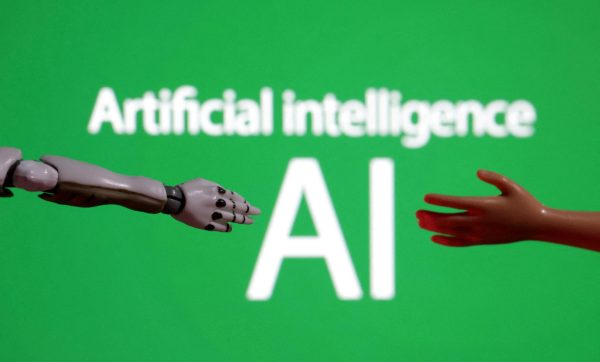Squid Game and its underlying capitalistic themes
Major spoilers for Squid Game ahead.
Squid Game, the Korean fictional drama that swept over Netflix, provided the audience with a fresh, eerily dystopian sensation, racking up nearly 111 million views worldwide in four weeks. The simple idea of falling victim to a series of supposed “games” only to be brutally murdered was enough to make anyone feel uneasy. Yet, the show raises a more serious and incredibly controversial topic: capitalism.
Some claim that Squid Game is a satire of communism more than capitalism. In an article published in Evie Magazine, writer Meghan Dillon argues that Squid Game is “more about the elites versus us and how we’re just toys for their entertainment.”
Though the anti-capitalist themes are undeniable. The creator of the show Hwang Dong-hyuk even said, “I wanted to write a story that was an allegory or fable about modern capitalist society, something that depicts an extreme competition, somewhat like the extreme competition of life.”
The series follows the main protagonist Seong Gi-hun, a desperate debtor living a pathetic life in Korea, constantly searching for strategies to financially support himself and his family yet always resorting back to gambling. One day, he meets a stranger who offers him the opportunity to make millions of dollars by winning a series of childhood games. Gi-hun’s hunger for money eventually leads him and 455 other debtors to the game of mass genocide known as Squid Game. Eventually, these games become entertaining brawls to the death for the ultimate prize: money.
To be exact, the death (or ‘elimination’) of each player adds another million won to the prize money for a total of 45.6 billion won or $38.6 million.
Later in the series, we learn that the entertaining aspect pertains to the elite, or VIPs, who bet large sums of money on each player for fun, like betting horses in a race. Whoever’s player makes it to the end wins the bet and the survivor obtains all the prize money.
It is at this point that the viewer is presented with one of the issues of capitalism: the illusion of choice. Each decision a player makes seems to be their own decision. They choose to play the game, they choose to sign their rights away, they vote to end the game, they chose to return to the game, they chose which shape they’d like to carve with a toothpick, or who they’ll compete against, or who chooses to die first while discerning between normal or tempered glass.
Squid Game presents this system supposedly run by choice as rigged. Severely rigged.
For example, all the players come from similar backgrounds: financially challenged, in extreme debt, and desperate for money. Thus, when given the opportunity to make a fortune playing children’s games, the answer is obvious. Why live a pathetic life of poverty when you could make a fortune?
But no one informs the players that their lives are on the line.
One of the most shocking events of the series is after the first game when the players realize the game is mass genocide. They are given the opportunity to vote whether to continue the game or not. One would think everyone would choose to end the game for the sake of life; however, the vote ends up being 100-101.
And it does not end there. With only one vote securing the players’ freedom, all 456 participants are violently thrown back into society and forced to live their helpless, pathetic lives, until 93% of them return to Squid Game. While yes, nearly all the players may have returned by choice, the lives they live in the capitalist society are inherently unbearable.
Francesca Newton, editor of Tribune, said “they find themselves on the run from the police, struggling with medical bills, or abused by employers who refuse to pay – they soon return. This game, they decide, is no more brutal than the one being played in their day-to-day lives.”
This is the ugliness of capitalism that Squid Game portrays. Capitalism is said to guarantee social mobility for all classes through hard work and dedication. However, Squid Game proves this to be completely false, emphasizing how a capitalist society focuses solely on profit instead of the wellbeing of its workers.
This is displayed in Gi-hun’s past when he witnesses the death of his coworker at the hands of the police while on strike against a car company that had fired him and several workers for being financially unstable.
Essentially, in the show, the wealthy elites pay workers less and less to increase profit, causing the stratification of wealthy elites and lower classes wherein the rich get richer easier and the poor get poorer faster. Then, the lower classes are pitted against each other at the hands of the wealthy elites, doing the worst to their loved ones just for money.
Near the end of the series, we learn that neither the rich nor the poor could win in a capitalist society. In the last episode, only Gi-hun ultimately earns the prize money as the sole survivor since he had done his hard work to win, yet all at the expense of hundreds of human lives. At first, he refuses to touch the blood money.
However, he rejects this systematic profitability at the expense of others and decides to use the money to dismantle the entire system.
Whether you like it or not, Squid Game is a criticism of modern-day capitalism and a portrayal of the brutality and oppression it inflicts upon people of lower classes.

Nimrah Khan is a senior at RCHS, and this is her third year in journalism. She is the editor-in-chief of the school newspaper, The Cat’s Eye. Her favorite...





Ari • Jan 19, 2025 at 5:57 pm
lol nobody cares